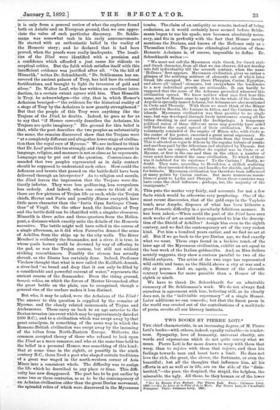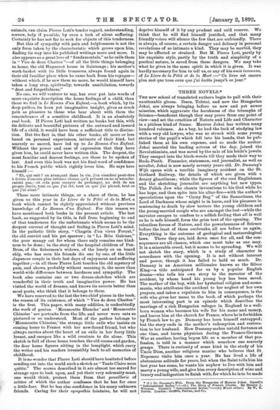TWO BOOKS BY PIERRE LOTT.* THE chief characteristic, in an
increasing degree, of M. Pierre Loti's books—with others, indeed, equally valuable—is tender- ness. Sympathy, love of humanity, universal charity, are words and expressions which do not quite convey what we mean. Pierre Loti is far more drawn to weep with them that weep, than to rejoice with them that rejoice, and thus his feelings towards man and beast have a limit. He does not love the rich, the great, the clever, the fortunate, or even the beautiful; but all the thoughts that influence him, all his efforts in art as well as in life, are on the side of the "disin- herited,"—the poor, the despised, the stupid, the helpless, the miserable, the ugly. All these, be they human or of the lower
• (1.) Le Roman dean En/ant. Par Pierre Loti. Paris : Calmann Levy. 1890.—(2.) Le Litre de le Pitie et de la Mort. Par Pierre Loti, de l'Academie Francais*. Paris : Caiman Levy. 1891.
animals, can claim Pierre Loti's tender regard, understanding, sorrow, help if possible, by even a look of silent suffering. Certainly he has not far to seek for objects of this tenderness.
But this of sympathy with pain and helplessness is not the only form taken by the characteristic which grows upon him, finding its way into his published writings more and more. It also appears as a great love of " fundamentals," as he calls them in " Vies de deux Chattes "—of all the little things belonging to home, the old Huguenot house in Saintonge ; his mother's work-basket with its little treasures, always found again in their old familiar place when he came back from his voyages— without which, if he saw them no more, he would himself have taken a long step, spiritually, towards annihilation, towards " dust and forgetfulness."
No one, we will venture to say, has ever pat into words of
more exquisite description the home feelings of a child, than those we find in Le Roman d'un Enfant,—a book which, by its deep pathos, its keen yet imaginative insight, gives as much pain as pleasure to those who bear about with them the remembrance of a sensitive childhood. It is an absolutely real book. If Pierre Loti had written no books but this, with its delicate and beautiful pictures of the outward and inward life of a child, it would have been a sufficient title to distinc- tion. But the fact is, that his other books, all more or less based on personal experiences, intimate of their kind, but scarcely so sacred, have led up to Le Roman d'un Enfant. Without the power and ease of expression that they have given him, he could never have written this. The deepest, the most familiar and dearest feelings, are those to be spoken of last. And even this book was not his final word of confidence
to his French public which rightly loves him. He says here himself
:-
"Et, qui sait ? en avancant dans la vie, j'en viendrai pent-etre ecrire d'encore plus intimes choses qu'il present on ne m'arrache-
raient pas,—et eels pour essayer de prolonger, an deli). de ma propre dun's, tout ce que j'ai ate, tout ce que j'ai pleura, tout ce que j'ai aline."
These more intimate things, or a share of them, he has given us this year in Le Livre de la Pitig et de la Mort, a book which cannot be rightly appreciated without previous knowledge of Le Roman d'un Enfant. For this reason we have mentioned both books in the present article. The last book, as suggested by its title, is full from beginning to end
of that tenderness for the unfortunate which seems to be the deepest current of thought and feeling in Pierre Loti's mind. In the pathetic little story, " Chagrin d'un. vieux Foreat," the old convict and his pet sparrow ; in " Ls Bête Galeuse," the poor mangy cat for whom there only remains one kind- ness to be done ; in the story of the hospital children of Pen- Bron, of the fishermen's widows, of the lonely ox on board ship, who has seen his friends die one by one, of the little Japanese couple in their last days of enjoyment and suffering together ;—in all these Pierre Loti touches the old mystery of pain, and shows, probably without meaning it, the more than world-wide difference between hardness and sympathy. The book also contains one or two dream-sketches which are wonderful in their truth and imaginative power. He has visited the world of dreams, and knows its secrets better than most poets, who think that it belongs to them.
We have reserved to the last the two chief pieces in the book, the reason of its existence, of which " Vies de deux Chattes" is the first. This paper, with many oddities, is undoubtedly the work of genius. • Moumoutte Blanche' and • Moumoutte Chinoise' are portraits from the life, and never were cats so pictured or so understood. Moat of the pathos belongs to • Moumoutte Chinoise,' the strange little exile who insists on coming home to France with her new-found friend, but who always carries about the heart of an exile in her furry little breast, and escapes like a wild creature to die alone. This sketch is full of those home touches, the old rooms and garden, the dear home figures sitting in the lamplight, which carry the writer and his readers irresistibly back to all memories of ehildhood..
It is no wonder that Pierre Loti should have hesitated before
sending out into the world such a sketch as " Tante Claire nous quitte." The scenes described in it are almost too sacred for strange eyes to look upon, and yet their very solemnity must, one would think, protect them from that gouaillerie of critics of which the author confesses that he has for once a little fear. But he has also confidence in his many unknown friends. Caring for their sympathie lointaine, he will not deprive himself of it by any prudent and cold reserve. We think that he will find himself justified, and that many friendly voices will silence the few that are unfriendly. There is always, of course, a certain danger and delicacy in personal revelations of so intimate a kind. They may be morbid, they may be affected or strained. But M. Pierre Loti, partly by his exquisite style, partly by the truth and simplicity of a poetical nature, is saved from these dangers. We may take what he gives in the same spirit in which it is given. It was hardly necessary for him to tell us, or any of his antis inconnua, of Le Livre de la Pita et de la Mort :—" Ce livre eat encore plus moi que tous ceux que j'ai ecrits jusqu'is ce jour."















































 Previous page
Previous page